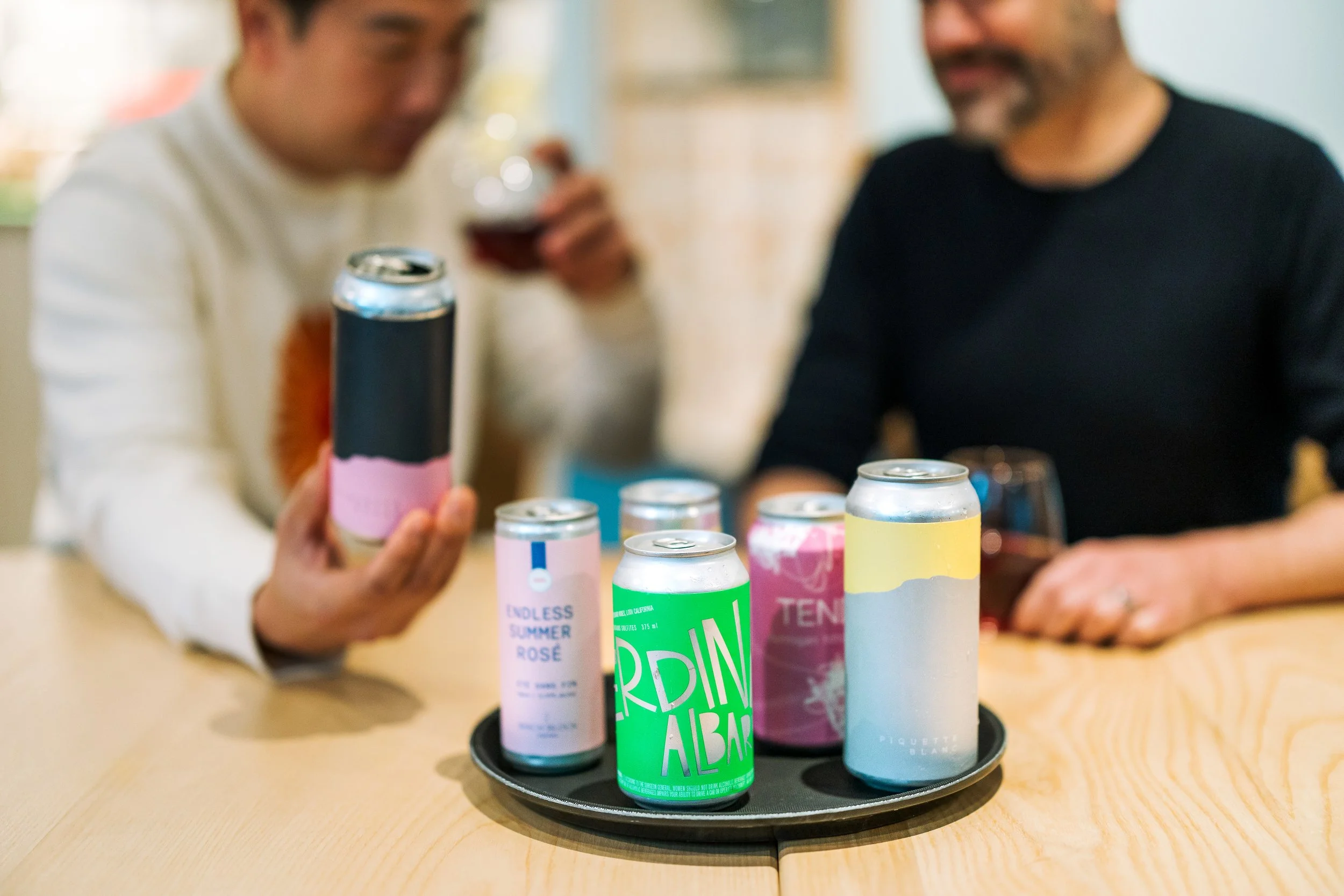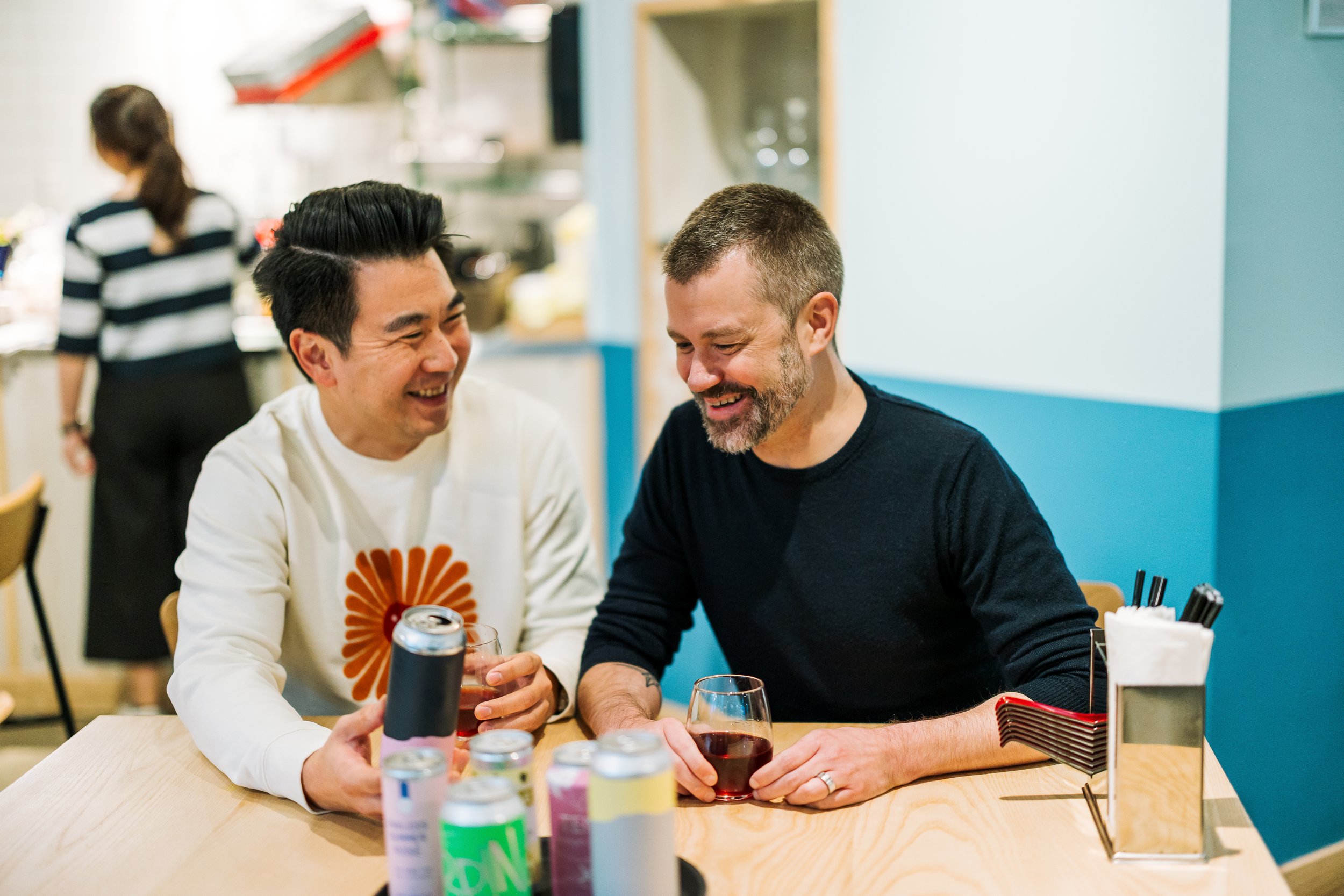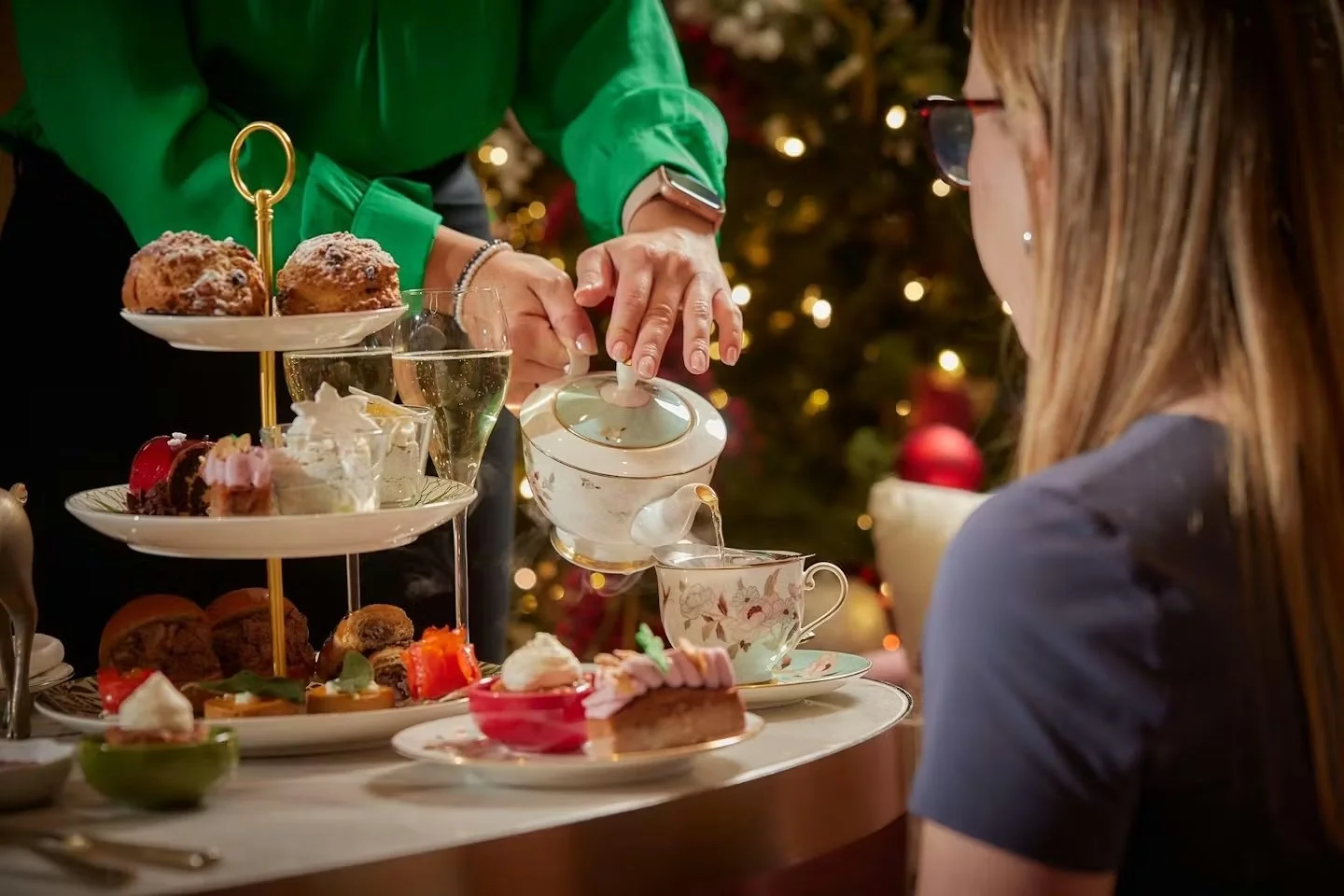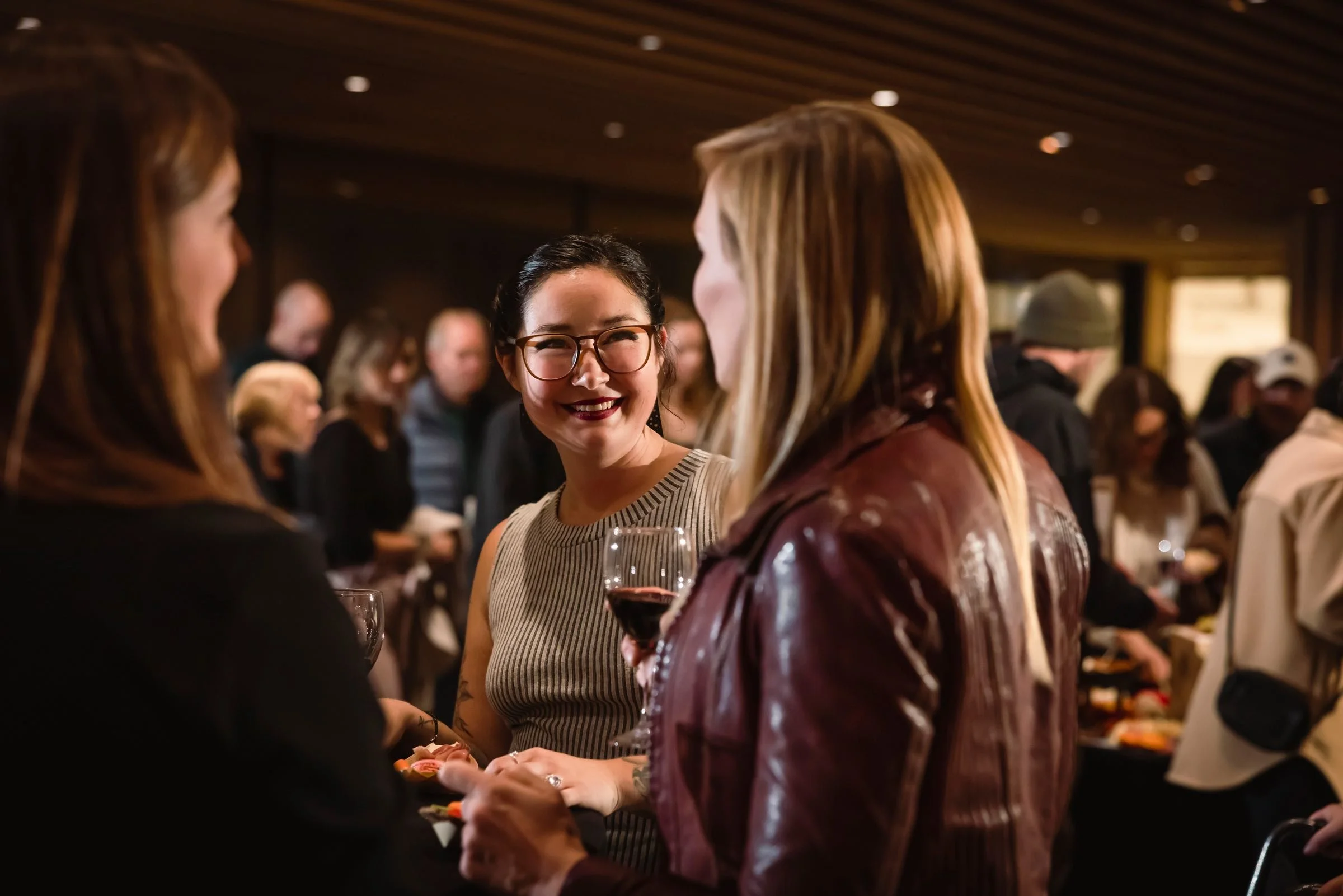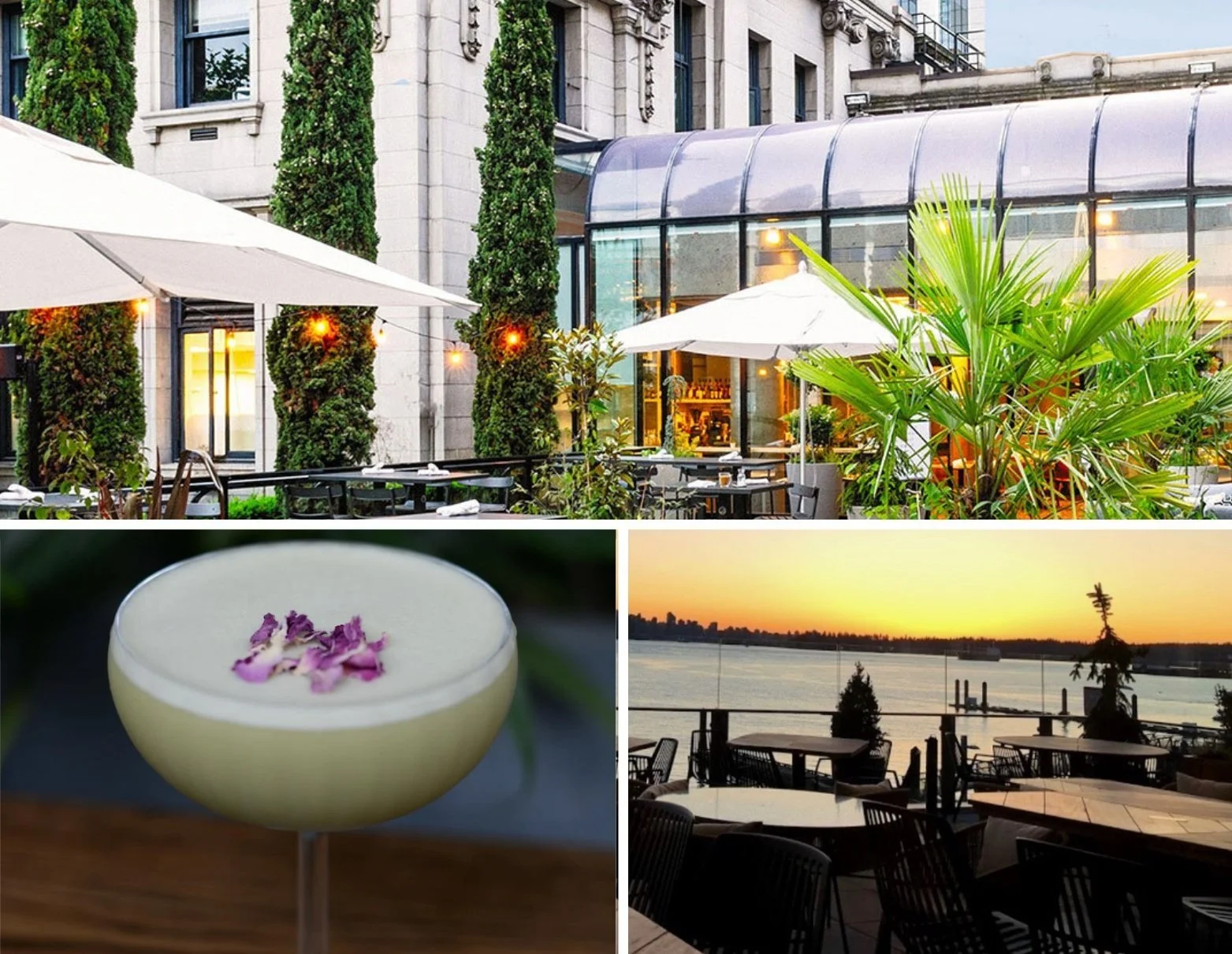At Vancouver’s Fat Mao, wine pairings are in the can
Sommelier Kurtis Kolt’s picks reflect growing interest in the art of canned wines
Angus An and Kurtis Kolt at Fat Mao Noodles Downtown. Photo by Anjali Spooner
AS A WINE CONSULTANT, Vancouver’s Kurtis Kolt can frequently be found creating wine lists and recommending food-and-wine pairings for restaurants. A career highlight was running the wine program for a few evenings at James Beard House in New York City during a stint hosted by local chef Angus An, whose ventures include the Michelin-recommended Maenam as well as Longtail Kitchen and Sen Pad Thai, among others. Usually, Kolt is working with bottles of wine. When An enlisted Kolt to come up with a wine list for his new downtown location of Fat Mao Noodles, though, it was a different ball game.
The hopping, licensed joint near St. Paul’s Hospital at 983 Helmcken Street serves Thai-style noodle soups with made-from-scratch broths (with your choice of spicy sauces, tangy vinegars, and oils) and sides of B.C. seafood, house-made tofu, and seasonal vegetable salads. It falls in the category of “fast-casual”: it’s sit-down table service, but not the kind of place where people typically linger for a languorous meal. Only a small percentage of guests want a glass of wine with their tom yum goong or vegetarian khao soi, never mind a whole bottle. Once a restaurant opens a bottle, it needs to be used up quickly or else it goes to waste. So Kolt turned to what’s becoming one of the fastest-growing beverage categories on the planet: canned wine.
“I'll be honest; it was a bit if a curveball when Angus challenged me to create a program with alternative packaging like this,” Kolt tells Stir. “Having an exciting and dynamic wine program for an awesome noodle joint like this is new territory, and he's well aware that it will take a bit to build a culture around it. The concern was having open bottles sitting there an extra day or two, and the potential for the quality of the product to waver. This way, we're guaranteeing the wine will be served as fresh and lively as Angus's food. Beyond that, the program was designed like any other I've built: quality, deliciousness, and balance of styles were all key.”
The canned format might bring to mind sugary soda pop and cheap beer, but it’s not at all unrefined in the world of wine.
“Canning wine is arguably the best way of ensuring the final product is sound; freshness guaranteed,” says Kolt, who’s also a partner in Top Drop, a terroir-focused wine show coming up in Vancouver in May. “There's no cork, which can always introduce variability into the preservation of product, and since it's going to be a maximum of two servings, tops, you know your open juice isn't going to be sitting around getting oxidized or tired.
“The vessel doesn't deem quality,” he adds. “Where we are with canned wine is where we were 20 years ago with screwcaps. It's an extra assurance of quality preservation—and we don't think twice about twisting a cap from a favourite bottle nowadays, do we?”
The canned wine market is poised to grow at a lucrative rate, expected to reach over US$725 million by 2030, up from about US$242 million in 2021, according Straits Research
Angus An and Kurtis Kolt at Fat Mao Noodles Downtown. Photo by Anjali Spooner
If the pandemic gave rise to anything, it was gathering outdoors for picnics; combine that with municipalities allowing the consumption of alcohol in certain parks, and no wonder people are craving more portable and less fragile options for bevvies. Think camping, sunsets by the beach, barbecues, a round of golf, and the like: tossing a can or two of wine in a backpack is that much easier than bringing a bottle. People who live alone or want to keep their consumption in check also like single-serve options over a bottle.
Some of the wines featured on Fat Mao’s current list are selections from British Columbia's JoieFarm, Orofino, Birch Block, and Averill Creek; then there are Californian gems like Ferdinand Albariño and Matthiasson's 'Tendu' Rosé. They come in 250 mL (5 oz) single-servings; 375mL (12+ oz) “half bottles”, and 473 mL (16 oz) size, equal to a couple of glasses. Fat Mao also offers by-the-glass in three, six, or nine ounces from B.C.’s Orofino, by the bag. (It has craft beer and cocktails too, and various selections of the same at its original Chinatown location.)
“Birch Block ‘Endless Summer’ Pinot Noir Rosé 2021 couples with everything on the menu—the joy of pink wine!” Kolt says. “The juicy red fruit and tart bite of rhubarb cuts through the richness of the braised duck-leg noodle dish, which is in an aromatic soy broth with Asian celery and bok choy. Ferdinand Albariño 2020 is a Vinho Verde-esque natural wine with gobs of juicy lime that sits atop a pedestal of marzipan; the tom yum goong cloudy hot-and-sour prawn soup with a variety of mushrooms, galangal, lemongrass, and evaporated milk? Come on!”
Other B.C. wines have branched out to the can.
Summerland-based Okanagan Crush Pad crafts Bizou + Yukon cans in two styles: Bee-Zoo Bubbles (a bright, sparkling wine made with grapes grown on the winery’s Summerland and Oliver vineyards, perfect with shellfish or nothing at all); and Pinkie Rose (pair its vibrant fresh strawberry flavour with with cheese and charcuterie). They’re at Save-on Foods, Cypress Mountain, and Angry Otter Kits, among other retail outlets across B.C. (Taking its name from the winery’s two Great Pyrenees, the fun-loving wine also comes in 1.5L “pooch pouches” of Adventure Red and Wandering White.)
Stag’s Hollow Winery in Okanagan Falls is another: coming this spring are the 2022 Syrah Rosé, 2022 Muscat Frizzante, and 2022 Tragically Vidal.
And Strange Fellows Brewing offers a line of its own canned wine, all made from Okanagan grapes: Rosé (a juicy blend of Merlot and Malbec), White (Chardonnay, Viognier, and Muscat), and Red (Merlot, Cabernet Franc, and Cabernet Sauvignon).
It’s all a sign of shifting attitudes, not tastes.
“Really, I just want any pre-conceived, negative notions of canned wine to be thrown out the window,” Kolt says. “When you're tucking into Angus's cuisine at Fat Mao, you're not thinking about the bowl. You're excited about what's in that bowl. Think of our wines the same way. We're just taking 'cracking a cold one' to another level.”


